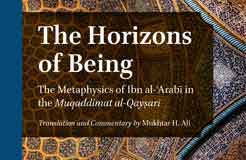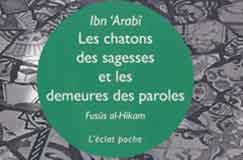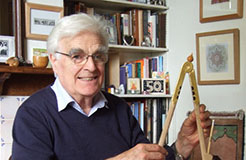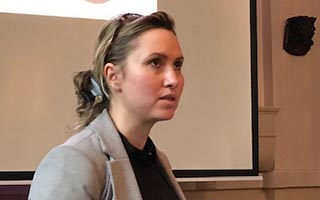The MIAS Blog: News and Views about Ibn Arabi
More Recent Posts

The Horizons of Being

Reading Circles in MIAS Latina

French translation of Fusûs al-Hikam

Keith Critchlow, 1933–2020

Online Introductory Course

Michel Chodkiewicz 1929–2020

Young Writer Award 2019
One of the most neglected issues
Eric Winkel
 At Haverford College (BA), then the University of Pennsylvania (MA), then the University of South Carolina (PhD), Eric Winkel undertook eclectic studies, mostly religion at first, focusing on spiritual matters, then later including political science, and numerous languages to enable study of religious and spiritual texts (Sanskrit, Greek, Coptic, Tamil, Arabic, others, besides French and German). His book “Mysteries of Purity, Ibn al-'Arabî's asrâr al-țahârah” (Notre Dame, 1995) was Chapter 68 of the Futuhat al-Makkiyya. While Senior Research Fellow at the Institute of Advanced Islamic Studies in Malaysia, he explored how the concepts of the “new sciences” opened obscure and difficult passages of the Futuhat.
At Haverford College (BA), then the University of Pennsylvania (MA), then the University of South Carolina (PhD), Eric Winkel undertook eclectic studies, mostly religion at first, focusing on spiritual matters, then later including political science, and numerous languages to enable study of religious and spiritual texts (Sanskrit, Greek, Coptic, Tamil, Arabic, others, besides French and German). His book “Mysteries of Purity, Ibn al-'Arabî's asrâr al-țahârah” (Notre Dame, 1995) was Chapter 68 of the Futuhat al-Makkiyya. While Senior Research Fellow at the Institute of Advanced Islamic Studies in Malaysia, he explored how the concepts of the “new sciences” opened obscure and difficult passages of the Futuhat.
Having studied Ibn Arabi’s Futuhat al-Makkiyya for over twenty-five years, Eric Winkel is now in the midst of an eleven-year project to produce the first complete translation of this work. For more information see links below to The Futūḥāt Project
The Futūḥāt Project
Articles by Eric Winkel
Abu Madyan’s Child, Per Singular Momenta and the Skull Suture: Understanding Ibn Arabi’s Futuhat
Understanding, and Translating, the Futuhat al-Makkiyya
Ibn Arabi’s fiqh: Three Cases from the Futuhat
Time Is Not Real: Time in Ibn Arabi, and from Parmenides (and Heraclitus) to Julian Barbour
Podcasts by Eric Winkel
Abu Madyan’s Child, Per Singular Momenta and the Skull Suture: Understanding Ibn Arabi’s Futuhat
But let us look now at an idea found at the end of the page introducing the Futūḥāt Project itself:
There is not in all possible worlds
any more wondrously original than this world.
This may also be expressed as: ‘This is the most perfect of all perfect worlds. This is the most perfectly complete of all the worlds.’
Now this is a hard one to swallow! As I read this statement, I think: ‘Not so fast; I’ve got some questions. If what you say is true, you’re going to have to convince me.’ And if you have similar misgivings—well, it turns out that we are in good company. This is ‘one of the most neglected issues’, Ibn al-’Arabi says.
One of the most neglected issues, an issue that even our friends often neglect, is tied to the verse that God gave each thing its character-creation, then guided it (Qurʾān 20:50). So everyone has been given a character-creation, a kind of way of being, and then has been guided. Ibn al-’Arabi says that with this verse we are to understand there is no way that we can say, ‘I want this’ or ‘I lack that.’ There is nothing missing; there is nothing that is not perfect. This is the most perfect of all perfect worlds, the most complete and perfect of all the worlds. There is nothing that we are lacking and nothing that we are wanting. To understand this is to understand that God created this creation—and gave each thing its character-creation and guided us.
But we get confused because we think that this creation was made for us, or that ‘It’s my creation.’ And if it’s my creation, then I have a lot to say about how it’s not perfect. ‘I would like to have more people like this and fewer people like that’; and ‘I’m definitely lacking this’; and ‘If only I had that, things would be much better.’ All of these very natural and common feelings are based on an assumption, a hidden assumption, that the creation is made for me and I am the creator of this creation. But to know that the world, the creation, was created not for me but for God’s names, Ibn al-’Arabi says, turns the whole picture around.
So then, when you see things that are happening which you don’t like, you realize that these things that you don’t like—such as all these injustices and awful events—they are actually there in order for the Divine names to be used and to be in effect, and to have force and not be idled. And Ibn al-’Arabi takes this to the ones who said—and he won’t say who said this, but we all know—in al-Baqarah 2:30: Are you making on her (on the Earth) one who would pollute her and spill blood? This is the idea that You, the Divine, are going to make these human beings, and they are going to pollute the Earth and they are going to spill each other’s blood. And what kind of world is that? Well, it’s the kind of world that is the perfect world for the Divine names to be able to display their ruling force. And so errors and mistakes and sins and offences—all of that is there for the Divine names. And in fact, Ibn al-’Arabi says that the Messenger of God says that if you did not offend, God would have gone to a people who would offend—and then they would ask for forgiveness, and God would forgive them.
So quite clearly the reason we have these offences is so that there is an asking for forgiveness and a Divine forgiveness. And if there were no calling for forgiveness and nothing to forgive, then the Divine name the Forgiver, the All-Forgiving, would be idled and would not be able to display its entire force. Therefore, this problem that we all face—about, ‘Why is the world this way?’ ‘Why isn’t it that way, and why can’t it be better?’—is relieved, and the question is relieved when we look at why we are assuming that the world is not the perfect place. And we are assuming that because we want this world to be ours, and we want it to be that we are the creators. Ibn al-’Arabi is saying that this is something that even our friends—even the very elevated friends of God—even they will forget this at times and not realize that the world was created for God’s names to be active and to rule.
Therefore, the world that we have right now is the perfect world—and there is no better world somewhere else, and there would be no better world if one or two things were to change. There’s nothing better than what is. This, Ibn al-’Arabi says, is one of the most neglected issues.
God gave each thing its character creation, and then guided it. So we slowly, gently, accept that everything that is, is a creation of God. And everything that is, is perfect for the One who created it. And then indeed we will be guided.
